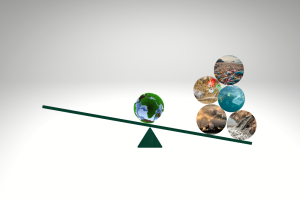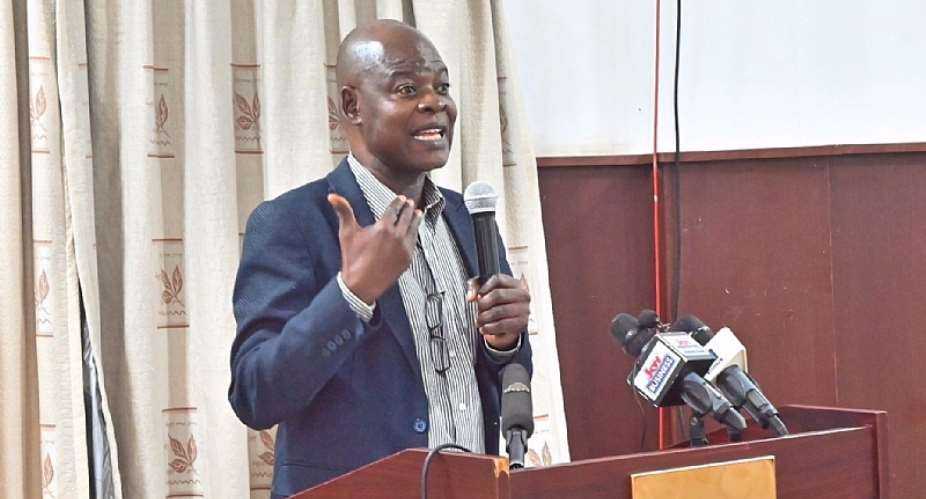
By: Hilda Aku ASIEDU
When we talk about climate change, one phenomenon scientists often use is the tipping point. A tipping point happens when small changes build up until they cause big, often irreversible effects on the Earth.
Imagine the earth as an egg lying almost at the edge of a table; one tiny nudge might seem harmless, but eventually, the egg can tip over and fall if it is constantly nudged towards the edge of the table.

Many people wonder: How does throwing away a plastic bottle, cutting down a tree, or using a plastic bag really affect the climate? The answer is in how delicate and connected our ecosystems are. Even small stresses on nature can push the planet closer to tipping points.
First, let’s talk about Climate stressors, these are factors that disturb the balance of nature. Some are natural, like floods, fires, or volcanic eruptions. Others are caused by humans, like cutting down forests, burning fossil fuels, polluting oceans, or overfishing.
One action alone may seem small, but when many people do the same thing or this action is repeated over time, it creates a wave of pressure on ecosystems.
- Plastic Pollution: Plastics in oceans harm marine animals, damage coral reefs, and disrupt the ocean’s role as a vital carbon sink that absorbs one-third of human carbon emissions. This degradation reduces the ocean’s capacity to mitigate climate change.
- Deforestation: The World Economic Forum highlighted in 2025 that cutting down forests not only reduces carbon storage but also disrupts local and regional rainfall patterns, changes that can extend well beyond deforested areas. For example, tropical deforestation has been linked to decreases in monthly rainfall by approximately 0.6 mm per percentage of forest lost.
- Overfishing: The UNFCCC 2022 article published in June points out that overfishing not only devastates fish populations and wildlife, but it also undermines the ocean’s ability to perform critical ecosystem services such as storing carbon that is needed for climate mitigation.
- Food Waste: The U.S. Environmental Protection Agency (EPA) reported in 2025 that decomposing food in landfills produces methane, a greenhouse gas over 25 times more potent than carbon dioxide over a century, thereby making food waste a significant contributor to climate change.

Now, tipping point is “a critical threshold beyond which a system reorganizes, often abruptly and/or irreversibly,” resulting in a significant shift from one stable state to another. Key examples include;
- Melting Glaciers and Ice Sheets: Research shared by the British Antarctic Survey underscores that warming triggers ice melt, reducing reflective surfaces and exposing dark land or ocean that absorbs more heat, creating a feedback loop that accelerates melting and sea-level rise.
- Amazon Rainforest Dieback: Findings from Earth System Models published in 2025 indicate the Amazon could transform from a carbon sink to a carbon source due to deforestation and warming temperatures, exacerbating climate change.
- Coral Reef Collapse: National Oceanic and Atmospheric Administration’s 2015 research explains that warming oceans and pollution cause coral bleaching, threatening marine ecosystems that support fisheries, coastal protection, and oceanic carbon storage. Once enough reefs die, the marine ecosystems that depend on them collapse, affecting fish stocks, coastal protection, and oceanic carbon storage.
The Earth is a web of ecosystems that are interlinked; our Forests influence rainfall patterns across entire regions. Oceans regulate the global climate by storing heat and carbon. Ice sheets help maintain the planet’s energy balance by reflecting sunlight.
When one system falters, others can follow in a chain reaction. Melting Arctic ice doesn’t just raise sea levels; it can shift ocean currents, which then alter global weather patterns, threatening agriculture and water supplies thousands of miles away.
The balance of nature is what keeps our world stable and habitable. When we disrupt that balance even slightly, we push the Earth closer to dangerous tipping points.
Why every action matters
Climate change is not just the result of one big event; it is the product of millions of small actions and choices, accumulated over decades. This also means the solutions are within our reach. Choosing to reduce plastic use, protecting forests, and conserving energy these may seem like small steps, but they collectively reduce the stress on Earth’s ecosystems and slow the march toward tipping points.
The future of the planet depends on whether we recognize the importance of these connections and act on them urgently, boldly, and collectively.
The tipping point is not just a scientific theory. It’s a real-world risk, and every day, each one of us holds a piece of the balance in our hands.
Hilda is a Development Communicator and SDG Advocate.
email: [email protected]
LinkedIn: Hilda A. Asiedu
The post Climate tipping points: How small actions push the planet to the brink appeared first on The Business & Financial Times.
Read Full Story


















Facebook
Twitter
Pinterest
Instagram
Google+
YouTube
LinkedIn
RSS